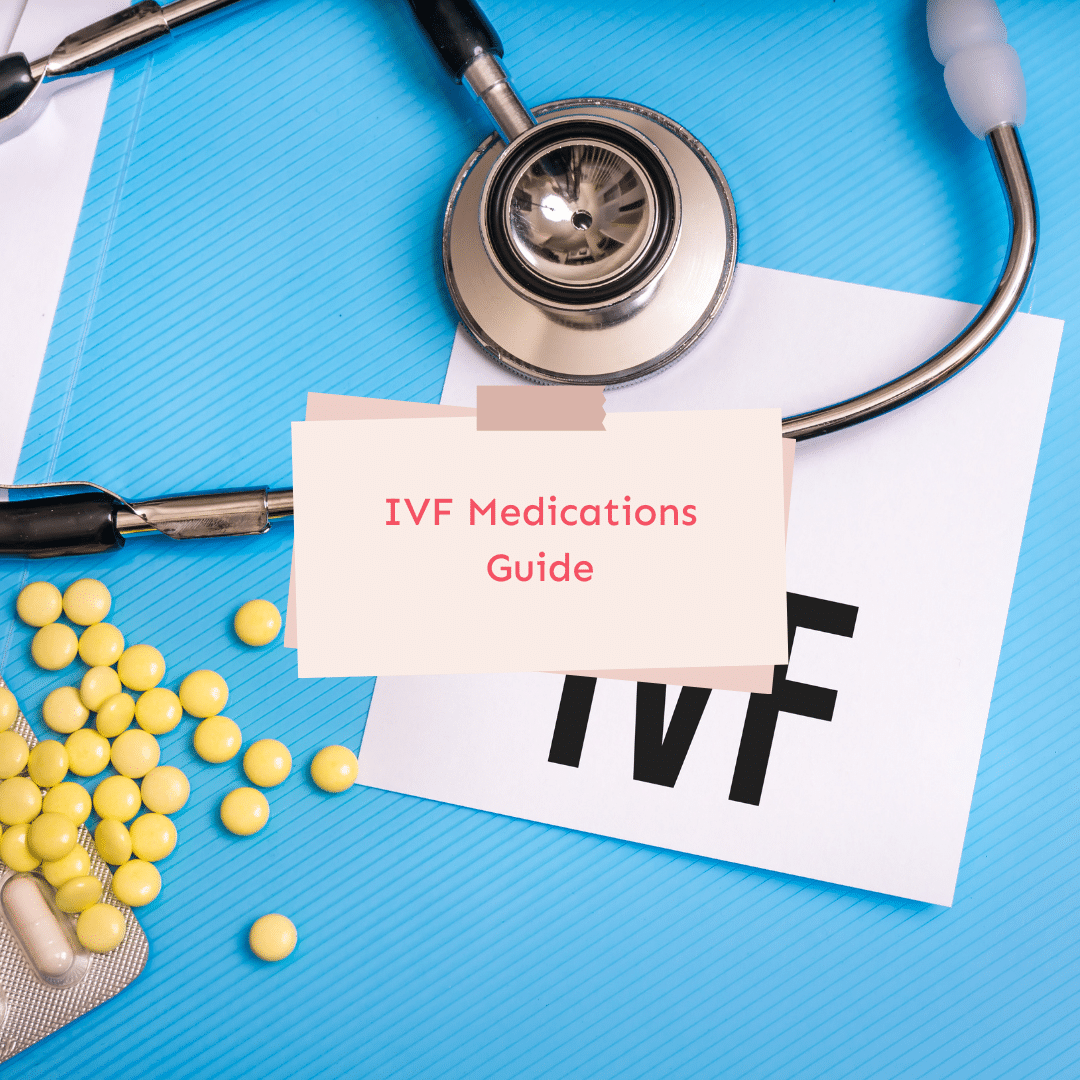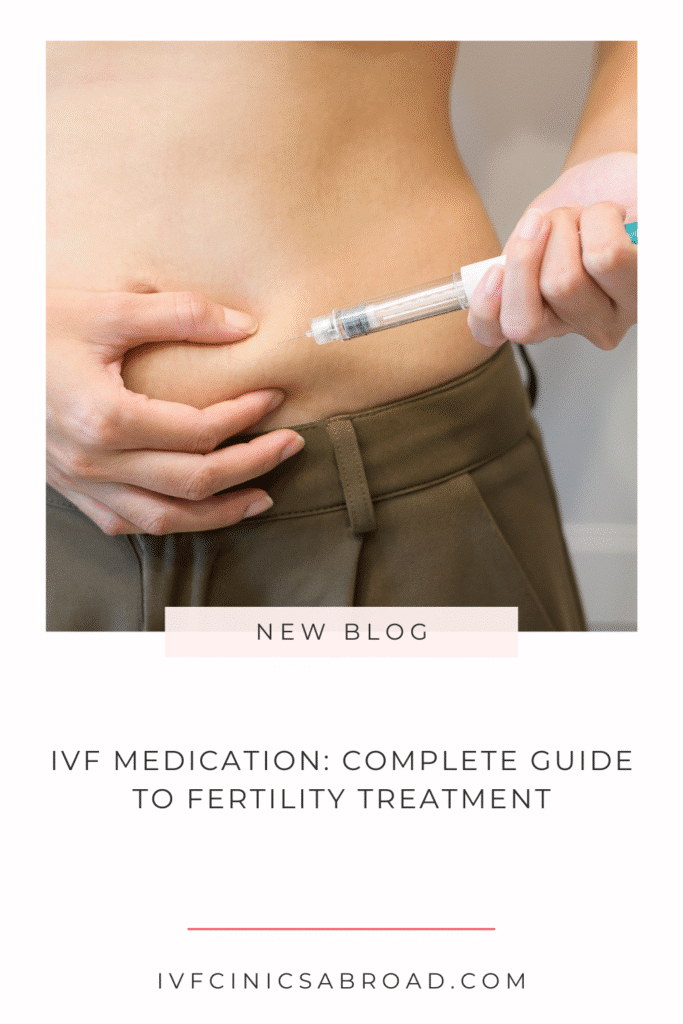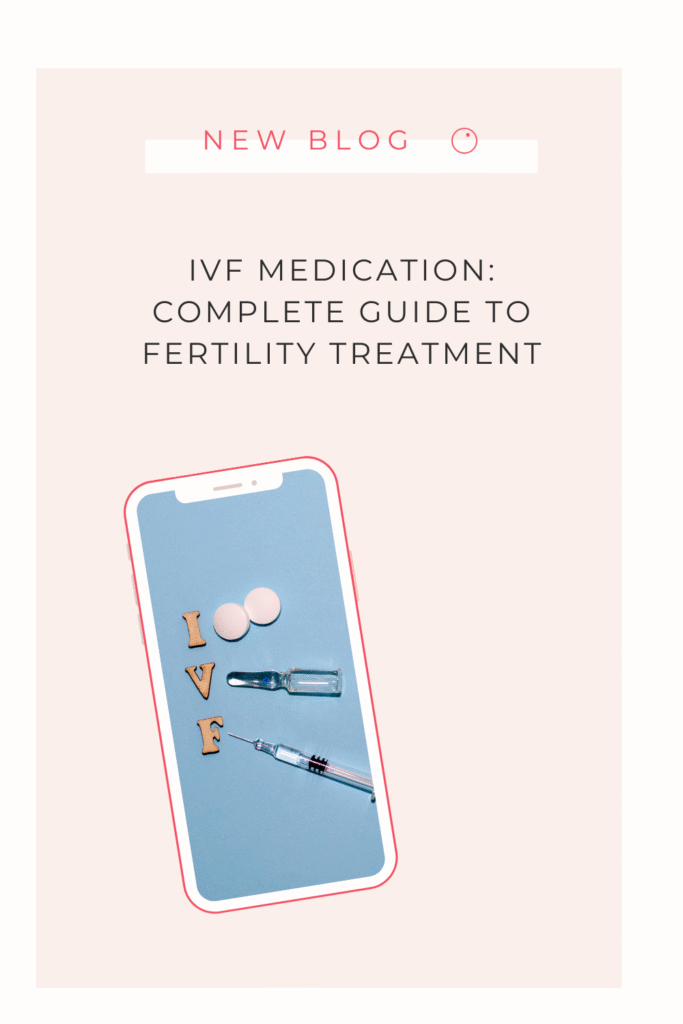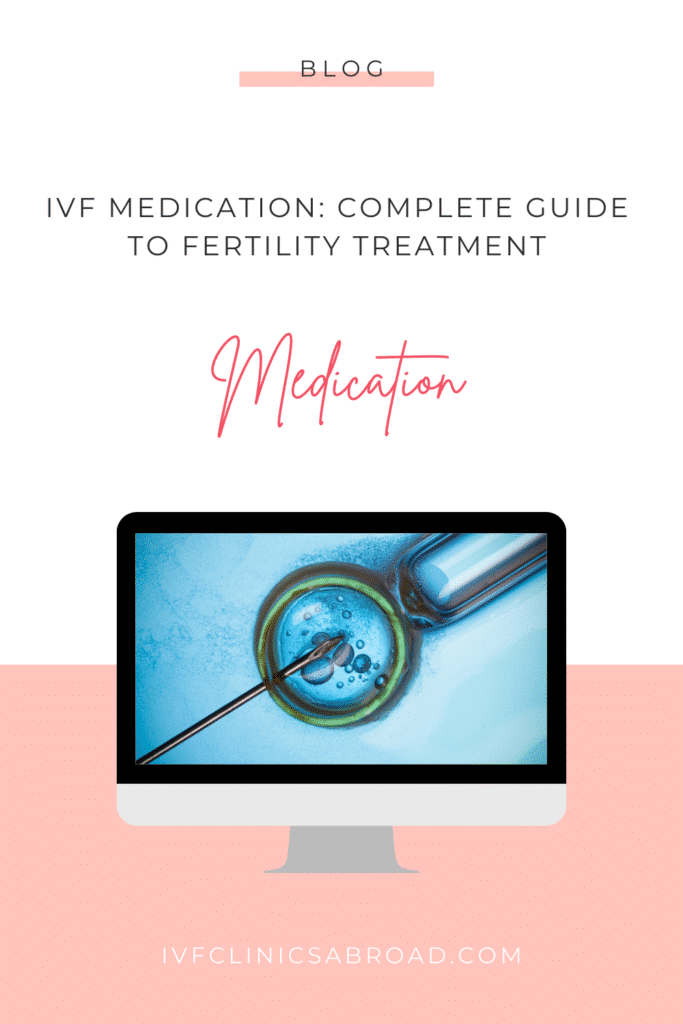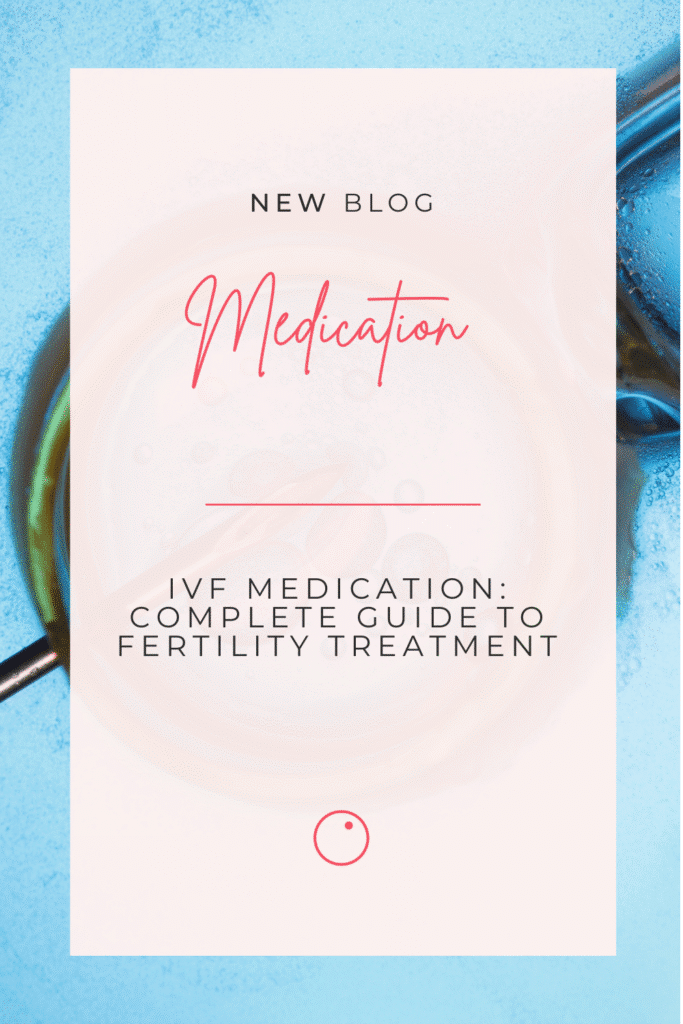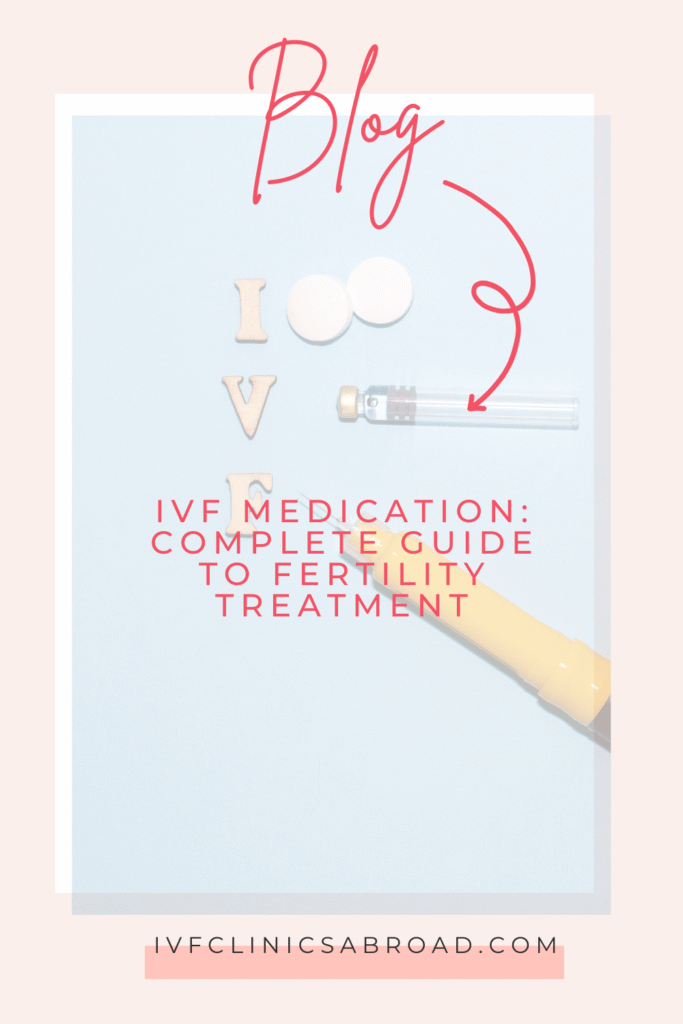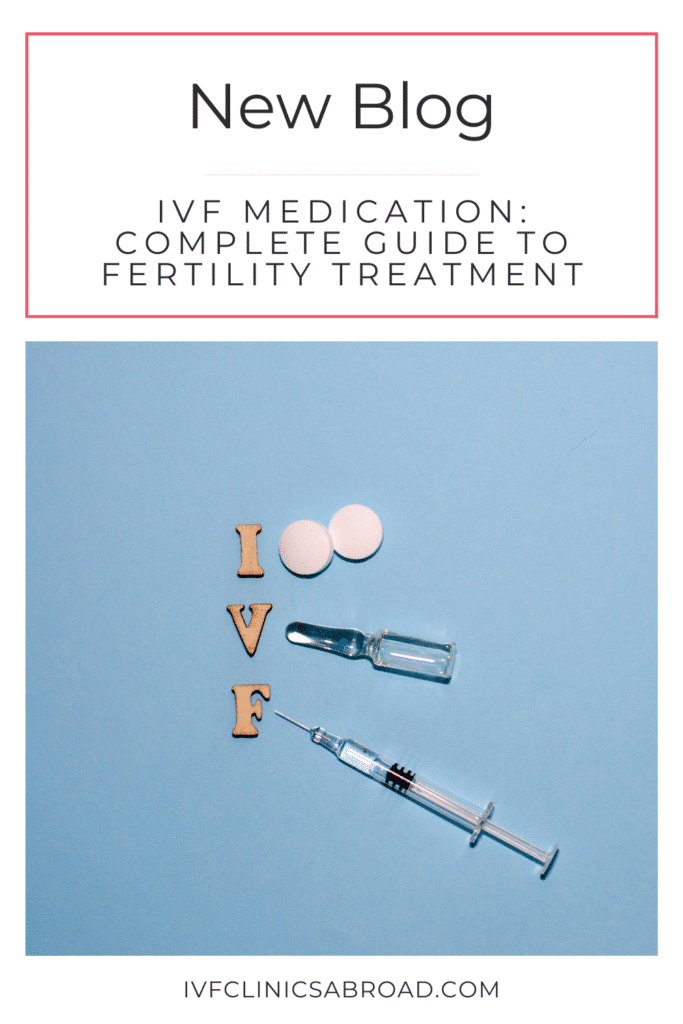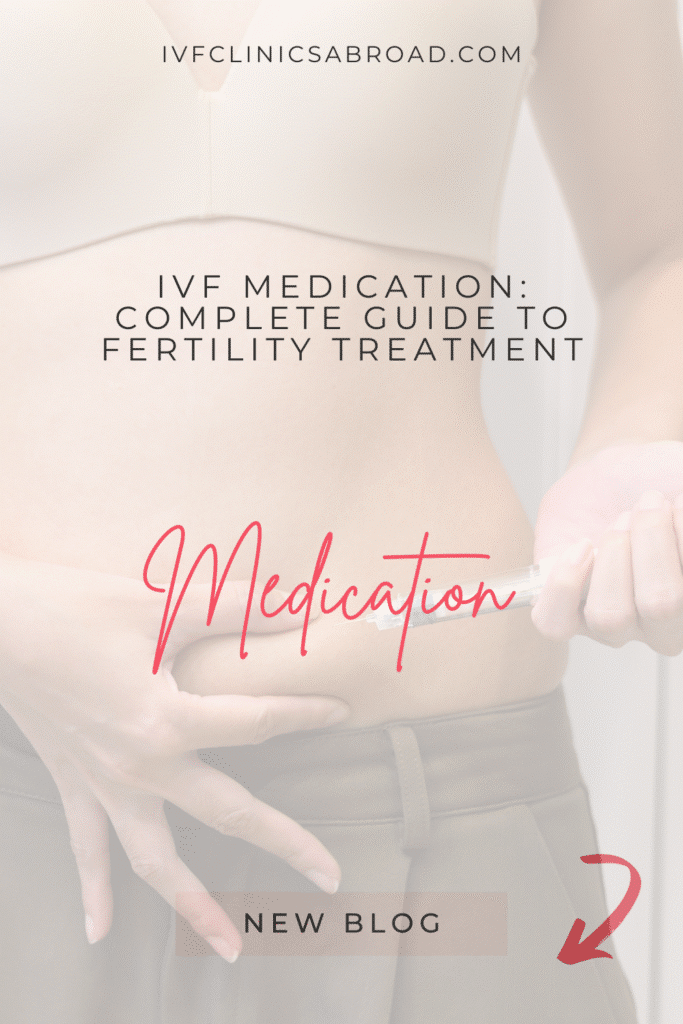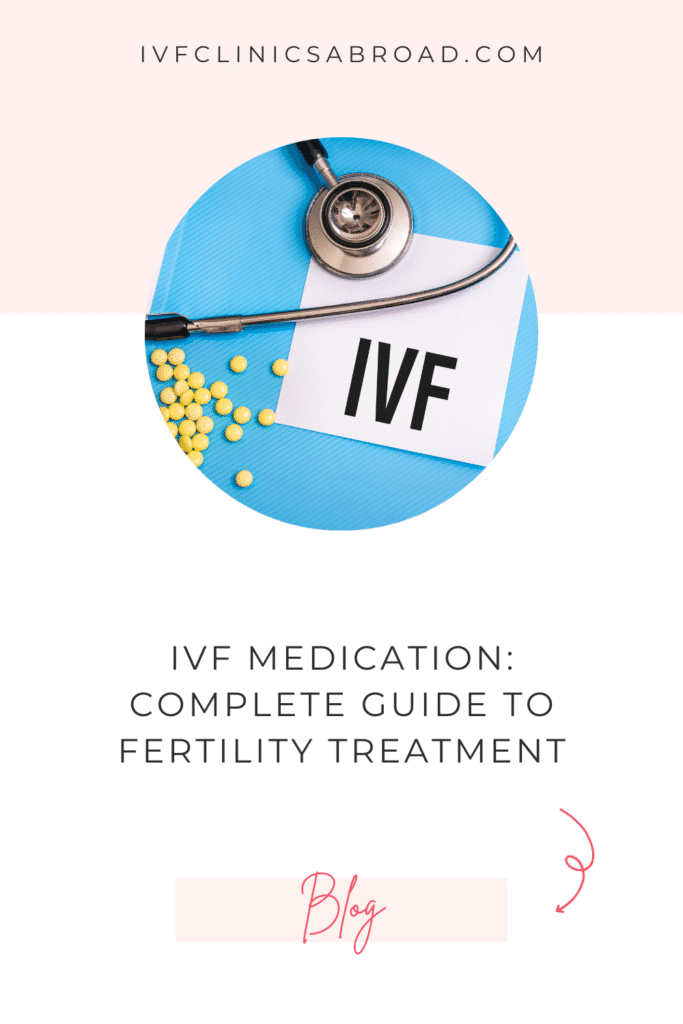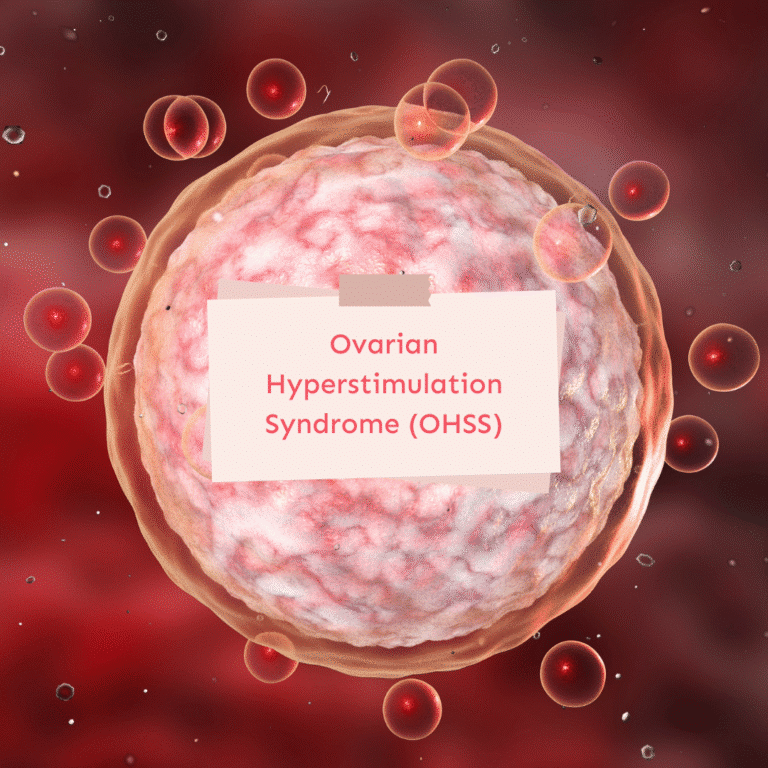IVF Medication – Complete Guide to Fertility Treatment
IVF Medication: Complete Guide to Fertility Treatment. Everything you need to know about IVF medication & the IVF cycle. A comprehensive guide to fertility treatment, ovarian stimulation & more.
Starting your IVF journey can feel like stepping into a world full of new terms, intense emotions, and a long list of medications you’ve never heard of. If you’re feeling overwhelmed – you’re not alone. This guide is here to help you make sense of the various medications involved in IVF and to guide you through every step of your fertility treatment with confidence and clarity.
Medications are a key component of the IVF process. They support your body in producing healthy eggs, help control your cycle, and prepare your womb for embryo implantation. From stimulation medications that encourage your ovaries to produce multiple follicles, to injections that trigger ovulation and prepare for egg retrieval – every step in the IVF treatment cycle depends on the right medication regimen, carefully adapted to your needs.
In this complete guide, we’ll explore the types of IVF medications used in fertility treatment, explain how IVF medications work, and help you understand potential side effects. Whether you’re just starting your IVF journey or already planning your medication protocol with your fertility clinic, this article will give you everything you need to know about IVF medications – in simple terms and with real support.
Let’s begin by understanding what IVF treatment is and how medication plays such a crucial role in it.
What is IVF treatment and why are medications essential?
In vitro fertilisation, or IVF, is a type of fertility treatment that helps you conceive when natural methods haven’t worked. During an IVF cycle, several carefully planned steps are taken to support fertilisation and early embryo development outside the body – before placing the embryo into the uterus. One of the most important components of the IVF process is the medication regimen. Without the right medications, it would be nearly impossible to control your cycle, stimulate your ovaries, or support implantation.
IVF medications are crucial because they allow your body to respond to fertility treatment in a controlled and predictable way. Through hormonal stimulation, your ovaries are encouraged to produce multiple follicles instead of just one, which increases the number of eggs available for fertilisation. This process is known as ovarian stimulation, and it is often the first step in the IVF cycle. The medications involved in this phase help stimulate the ovaries to produce more eggs than they would naturally – giving your treatment the best possible starting point.
Later in the cycle, other medications help prevent premature ovulation, trigger final egg maturation, and prepare your womb for embryo implantation. These medications are often given as injections under the skin, and their timing and dosage are adjusted according to how your body responds. It’s a delicate balance – and one that’s guided closely by your fertility clinic.
Understanding IVF medications and their role in each phase of treatment can make the entire experience feel less confusing and more manageable. In the next section, we’ll look more closely at the different types of IVF medications and how they support each step of your fertility journey.
Understanding the types of IVF medications and how they support your fertility
IVF medications play a vital role in each stage of the treatment cycle. They are designed to guide your body gently through the different phases – from stimulating the ovaries, to egg retrieval, to preparing for embryo transfer. While the exact medication protocol can vary depending on your treatment plan, there are several core medications that are commonly used in IVF, each with a specific purpose.
One of the first steps involves stimulation medications, which help the ovaries to produce multiple follicles in a single cycle. This is different from your natural menstrual cycle, where usually only one follicle develops fully. With the help of fertility drugs, many follicles can mature at the same time – increasing the number of eggs that can be retrieved.
These medications typically contain synthetic versions of hormones like FSH (follicle-stimulating hormone) and LH (luteinizing hormone). FSH helps the ovarian follicles grow, while LH supports the final maturation process. A combination of both – sometimes called FSH and LH – is used in medications like Menopur. The goal is to stimulate the ovaries to produce as many healthy eggs as possible, while carefully monitoring your response to fertility treatment to avoid complications like ovarian hyperstimulation syndrome.
The medications are often injectable and are used daily during the first days of ovarian stimulation. This part of the IVF cycle is closely monitored through blood tests and ultrasound scans to track how many follicles are growing and how your body is responding.
As you move through your IVF journey, additional medications are added to the plan – each helping to prepare your body for the next step. Let’s now look more closely at what happens during the stimulation phase and how ovulation is controlled.
Stimulating the ovaries – medications at the beginning of your cycle
The first active step in most IVF protocols is ovarian stimulation – a phase where your body is gently encouraged to develop more follicles than it would naturally. This happens through a series of injections that introduce synthetic reproductive hormones into your system, helping the ovaries respond in a predictable and controlled way.
These injections are not random – they’re carefully selected based on your hormone levels, medical history and the overall treatment plan. The aim is to create an environment where several ovarian follicles can mature at the same time. Each follicle has the potential to contain one egg, so a good response here can increase the number of eggs collected later on.
Ovarian stimulation typically begins in the early days of your menstrual cycle. The medications involved include FSH and sometimes a combination of FSH and LH. These hormones are normally produced by your body in small amounts – but in IVF, they’re delivered in higher doses to help your ovaries produce multiple eggs. Depending on your situation, your fertility specialist might prescribe a product like Menopur, which contains both hormones in a single injection.
Throughout this phase, your response is closely monitored. The goal isn’t to produce as many eggs as possible, but rather to support the growth of a healthy number of follicles without overloading the system. Many follicles developing at once is a positive sign, but it must be balanced carefully to avoid complications such as ovarian hyperstimulation syndrome.
As this stage progresses, your doctor will decide when it’s time to move forward to the next step – preventing premature ovulation, and then preparing for egg retrieval. Timing here is everything, and that’s why this part of the IVF cycle is managed so precisely.
Preventing early ovulation – why hormone control matters
Once your follicles have started to grow, the next priority is to make sure they don’t release their eggs too early. In a natural cycle, your body would trigger ovulation through a surge of luteinizing hormone (LH). But during IVF, this natural process needs to be temporarily paused so that egg retrieval can happen at the ideal moment. That’s where specific medications help prevent premature ovulation.
To achieve this, your fertility team may introduce a gonadotropin-releasing hormone (GnRH) antagonist or, in some cases, a GnRH agonist. Both work in different ways to suppress the body’s natural hormone signals and maintain control over the timing of ovulation. This is a crucial part of the IVF process – without it, eggs could be released too soon and lost before retrieval.
These medications are also given as injections, often starting a few days after the stimulation phase has begun. The goal is to keep the follicles stable while they continue to grow, and to make sure your egg retrieval can be scheduled with precision.
This fine-tuned control of your hormonal activity helps protect the quality of your eggs and improves the overall outcome of the cycle. It also reduces the risk of ovulatory complications and supports a more predictable treatment protocol – something that brings confidence during what can otherwise feel like an unpredictable time.
When your follicles reach the right size and maturity, you’ll move on to the next step: triggering ovulation with a carefully timed injection. That’s the moment your eggs are prepared for collection – and we’ll guide you through it in the next section.
How your medication protocol is personalised by fertility specialists
No two IVF journeys are the same – and neither are the medications used along the way. One of the most important aspects of your treatment is the development of a personalised medication protocol. This is carefully created by your fertility specialists based on your individual hormone levels, your response to past treatments (if any), your age, and how your ovaries are likely to react to stimulation.
This tailored plan helps ensure that the medications are not only effective but also safe for your body. Some people need higher doses to encourage their ovaries to respond, while others benefit from a more gentle approach. Your fertility clinic will often start with a baseline hormone test and an ultrasound to check your ovarian reserve and overall cycle health. From there, they choose the combination of medications that will help your body respond in the most balanced way.
Your treatment protocol may include several different types of injections across the cycle – not all at once, but phased over time. Some medications help develop follicles, others control your hormone signals, and some prepare the uterus for embryo implantation. As your cycle progresses, your clinic may adjust doses or switch medications depending on how things are developing. These decisions are made in real time – based on daily or every-other-day monitoring.
Personalisation also means flexibility. If your ovaries are developing more slowly than expected, stimulation might be extended. If the risk of ovarian hyperstimulation becomes too high, the clinic might recommend freezing your embryos and postponing the embryo transfer. All of this is done to protect your health and improve your chances of IVF success – without rushing the process.
In the next section, we’ll look at which medications may be prescribed around the time of egg retrieval – and how they support this key moment in your treatment.
Medications that may be prescribed before and after egg retrieval
As your follicles approach maturity, your fertility clinic will carefully schedule the final step before egg collection – the trigger shot. This is a single injection that contains human chorionic gonadotropin (hCG) or a related compound, used to complete the final maturation of your eggs and prepare them for retrieval. The exact timing of this injection is critical: it usually happens 34 to 36 hours before the egg retrieval procedure, and it must be given at a specific time, often in the evening.
This step in the IVF cycle is one of the most time-sensitive. The medication mimics a natural LH surge – signalling the follicles to release their eggs. But because ovulation must not occur before retrieval, the eggs are collected just before they would naturally be released. A delayed or missed trigger can affect the number of eggs retrieved, so this part is closely monitored and planned down to the hour.
After egg retrieval, your body needs a different kind of support. The focus now shifts to preparing the endometrium for embryo implantation. This is usually done through progesterone supplementation – often as vaginal tablets, gel, or sometimes injections. Progesterone helps the lining of the uterus become receptive to the embryo, creating the right conditions for successful implantation after embryo transfer.
In some cases, additional medications may be prescribed to support the immune system or reduce inflammation, depending on your personal medical background. Antibiotics might also be used to prevent infection after the procedure, especially when the egg retrieval involves multiple follicles or minor irritation in the pelvic area.
Every step is part of a carefully balanced process – and every medication has its place. Knowing how they work together helps you feel more prepared and involved in your fertility journey.
How your fertility clinic adjusts your treatment plan
Throughout your IVF cycle, your fertility clinic plays a central role in guiding the treatment day by day. While the initial medication plan is based on your test results and personal profile, real success often depends on how well that plan is adjusted as your body responds.
Frequent monitoring is key: during ovarian stimulation, your clinic will check hormone levels and track follicle growth through ultrasound. This helps them decide whether your current medication dose is working as expected – or whether changes are needed to improve your response. Sometimes stimulation is extended by a few days to allow more follicles to mature. Other times, doses are reduced to avoid overstimulation.
Flexibility is essential, especially because no two ovaries react in exactly the same way. Even small shifts in hormone response can lead to big decisions – like when to schedule your egg retrieval, whether to trigger ovulation earlier or later, or whether to freeze all embryos and delay transfer. In rare cases, clinics may even switch medication brands or formulations if they believe your body will respond better to something else.
This close, personalised care helps make sure the medication protocol remains safe, effective, and tailored to your unique IVF journey. Your team isn’t just following a fixed plan – they’re actively responding to your body’s signals and doing everything they can to increase your chances of success.
Now that you’ve seen how carefully your treatment is managed, let’s look at another important topic: the potential risks and side effects of IVF medications – and what you can do to feel more informed and reassured throughout the process.
“IVF medication prices vary massively from country to country – and knowing where to buy can save you over €1,000 per cycle without compromising on quality.”
Nathalie Wiederkehr
Managing potential risks and side effects of fertility drugs
Like any medical treatment, IVF medications can come with side effects – and it’s completely natural to feel a little nervous about that. The good news is: most side effects are manageable, temporary, and closely monitored by your clinic. Understanding what’s possible (and what’s normal) can help you feel more in control throughout your treatment.
Some of the most common side effects include mild bloating, breast tenderness, mood swings, or headaches – especially during the ovarian stimulation phase. These symptoms are usually linked to the sudden change in hormone levels and typically disappear shortly after the stimulation ends. It’s also not unusual to feel some fatigue or emotional ups and downs during this time. You’re not imagining it – your body is working hard.
In a small number of cases, more intense side effects may appear. One of the most talked-about risks is ovarian hyperstimulation syndrome (OHSS), a condition where the ovaries become too swollen due to an overly strong response to medication. Symptoms can include rapid weight gain, abdominal pain or nausea. Your clinic will monitor your hormone levels and the number of growing follicles to help prevent OHSS before it becomes a concern. If the risk is high, they may recommend a freeze-all strategy to give your body time to recover before embryo transfer.
Other potential side effects may include temporary changes in your menstrual cycle or reactions at the injection site. If you’re ever unsure whether something is normal, it’s always best to reach out to your fertility specialists. They can explain what’s part of the expected process – and what needs closer attention.
What’s important to remember: side effects are not a sign that something is wrong. They’re simply your body’s reaction to a carefully managed process. With the right support, any discomfort can usually be reduced – and your treatment can move forward as planned.
Understanding the cost of IVF medications and what influences it
When starting your IVF journey, one of the biggest surprises is often the cost of medication. In many cases, the price for prescriptions can be as high – or even higher – than the medical treatment itself. What makes it even more confusing is that the cost of IVF medications varies widely from country to country. The same product can be up to 50% cheaper abroad – sometimes even more than €1,000 less.
The price differences are not due to quality but rather to national pricing policies, supply chains, and pharmacy systems. In some countries, certain brands are only available at a premium – while in others, generics or identical formulations are sold at a fraction of the cost. This means that, depending on where you live, ordering your medication from a reliable source abroad can lead to major savings without compromising your treatment.
We know where this is possible and safe – and in many cases, you can legally import medication with a prescription from your clinic. It’s not about cutting corners, but about being smart with your budget and making sure your money goes as far as possible.
Beyond geography, the final cost also depends on your personal treatment plan. Higher doses of stimulation medication or a longer ovarian stimulation phase will naturally require more vials, pens, or ampoules. Some people need only minimal doses, others may require stronger support to stimulate the ovaries to produce multiple follicles.
Other cost factors include the type of medication prescribed (original brand vs. biosimilar), whether you are doing a fresh or frozen embryo transfer, and your body’s response to fertility drugs. In some regions, health insurance or fertility programmes may cover part of the medication cost – but many people still pay everything out of pocket.
Having clarity from the beginning helps you plan ahead and avoid last-minute surprises. Knowing your options – including whether it’s possible to safely purchase medication abroad – can make a real difference not only to your wallet, but also to your peace of mind.
How medication affects IVF success and what science tells us
Medications are more than just a tool to control your cycle – they are one of the key factors that directly influence IVF success. From stimulating the ovaries to preparing the uterus for embryo implantation, each phase of your IVF treatment depends on how your body responds to the medications you’re given.
Scientific studies have shown that a well-balanced medication protocol can improve both the number of eggs retrieved and the quality of resulting embryos. For example, using the right dosage of FSH and LH at the right time can support the development of strong, healthy follicles, which increases the chances of retrieving mature eggs suitable for fertilisation. And when more mature eggs are collected, the probability of having good-quality embryos for transfer or freezing goes up.
Another factor is how consistently ovulation is controlled. Premature ovulation can lead to a cancelled cycle, while well-managed timing ensures that the eggs are collected before they are lost. Medications help prevent this by giving your clinic full control over when ovulation is triggered.
Success is also influenced by how your womb lining responds. A well-prepared endometrium increases the chances of successful embryo implantation. Progesterone and other hormone treatments are used to support this part of the process – often continuing until the pregnancy test or even several weeks beyond.
Of course, medication is just one part of a much larger picture – egg and sperm quality, age, underlying health conditions and embryo genetics all play a role. But without the proper medication support, even the best biological starting point can fall short.
What matters most is that your medication plan fits your body – and is adjusted based on how you respond, not just what works on paper. This personalised approach, backed by science and careful monitoring, is what gives you the best possible foundation for a successful IVF outcome.
What to expect during treatment – and how to feel more supported
Going through IVF isn’t just a medical process – it’s often an emotional rollercoaster. Even if you’ve done your research, it can still feel overwhelming once you’re in the middle of it. The appointments, the timing, the waiting… and all the decisions that need to be made. It’s okay if you don’t feel ready for everything at once. Most women don’t – and you’re definitely not alone in that.
What can help is knowing what’s coming. IVF treatment usually includes a series of steps: preparation, stimulation, egg retrieval, fertilisation and embryo transfer. Each phase comes with its own rhythm and emotional weight. Some days feel hopeful, others uncertain. Some days you’re managing fine, and then suddenly something triggers all the worries again.
It also helps to know that the treatment journey varies depending on where you go. Not just in terms of care, but also when it comes to legal options, available technologies and how well you feel understood. In some countries, you may have access to options like gender selection or donation that are restricted elsewhere. And sometimes, it’s not just about the medical part – but about how seen and supported you feel as a person.
You don’t have to navigate this alone. One of the best things you can do early on is find a clinic that matches your needs – not just medically, but emotionally too. That includes feeling heard, having clear communication, and knowing that someone will help you stay grounded when things feel complicated.
If you’re not sure where to start, we’re here to support you with exactly that. You don’t need to understand every detail about hormones or protocols – you just need to know where your options are. We’ll help you explore them.
Your next step: choosing the right clinic with clarity and confidence
Deciding to pursue IVF abroad is a big step – and finding the right clinic is often the hardest part. Every country has its own rules, possibilities, and limits. What’s available in one place might not even be allowed in another. And when you add language barriers, different medical standards, and financial questions to the mix, the search can quickly become overwhelming.
That’s exactly why we created something to make it easier.
Discover What’s Possible: Your Essential Guide to IVF Treatments in Europe
If you’re considering IVF abroad but don’t know where to begin, this guide will give you clarity. You’ll find an honest overview of what’s legally available in different European countries – including egg donation, embryo donation, gender selection, IVF for single and lesbian women, and even motherhood after 50.
You’ll also get average price ranges and success rates from Northern Cyprus, so you can better understand what to expect when planning your treatment abroad – without endless research or guesswork.
Stop guessing. Start planning with clarity and confidence.
Contact us if you need support choosing your clinic

